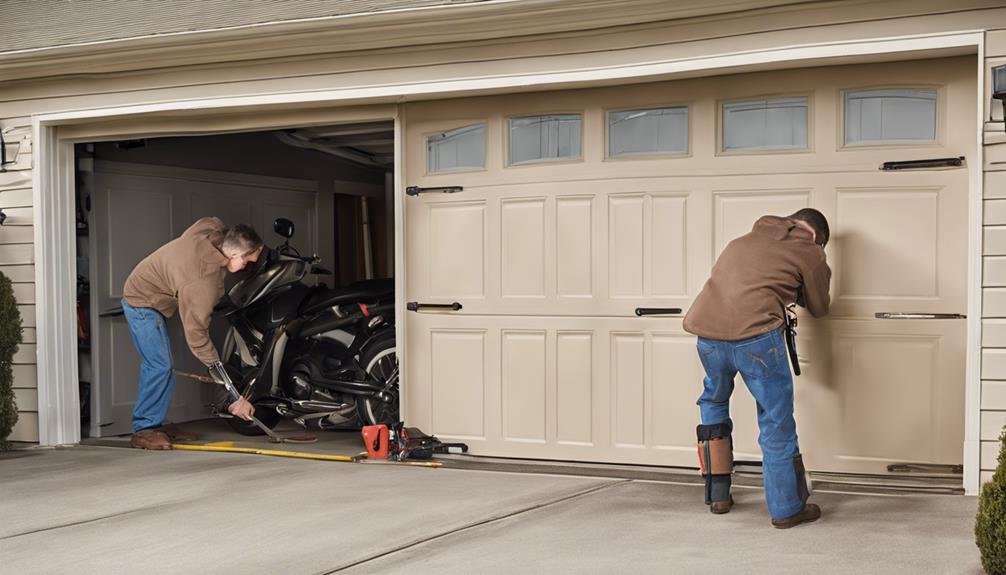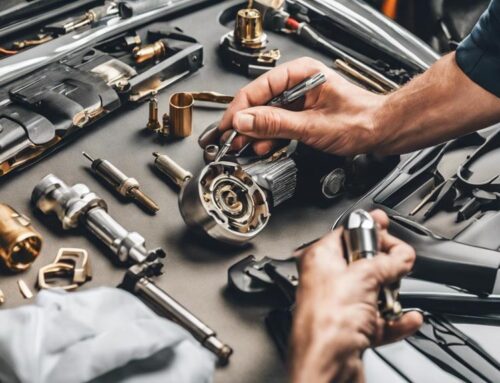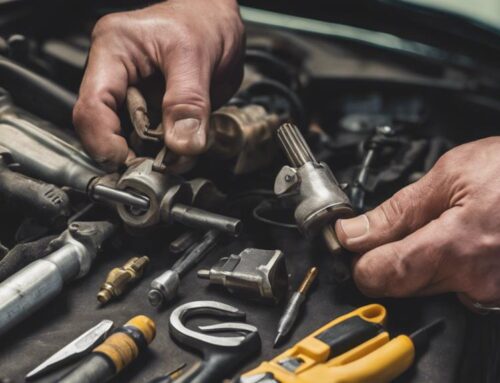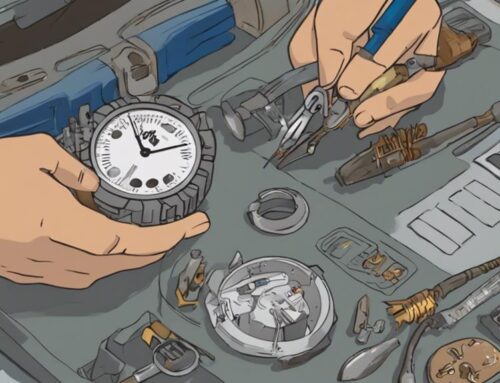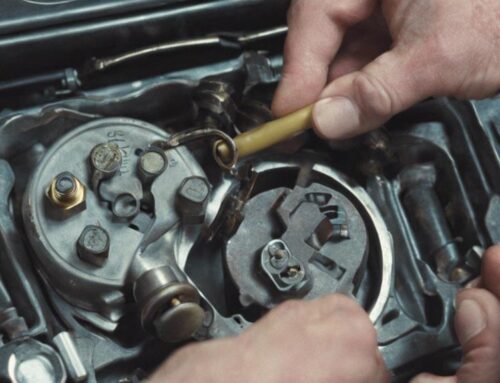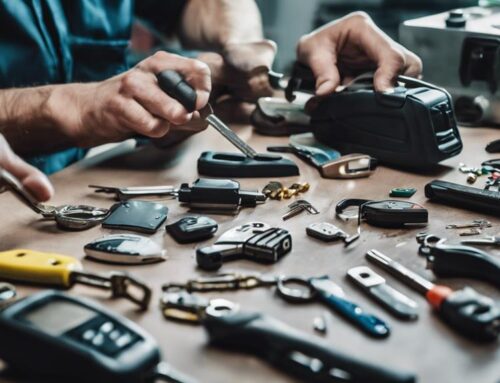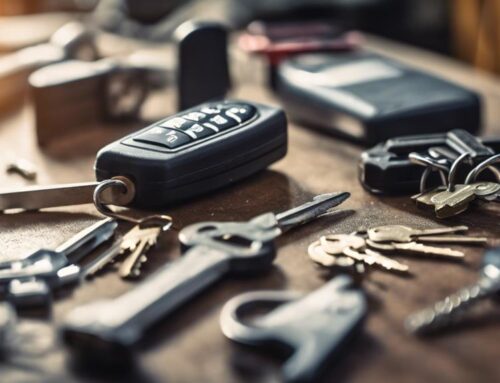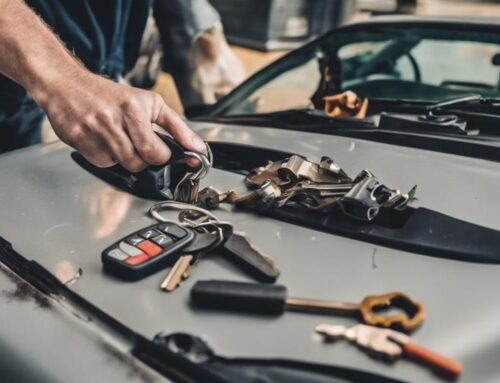To secure your garage, be aware of common issues with door locks. Wear and tear on mechanisms can reduce effectiveness, so maintenance like lubrication is key. Misalignment due to weather or wear can hinder operation – keep tracks aligned and rollers in good condition. Traditional locks may lack security against modern intruders, and key duplication risks unauthorized access. Upgrade to high-security locks for enhanced protection against forced entry, with features like drill resistance and restricted keyways. Understanding vulnerabilities and upgrading locks is essential for safeguarding your garage.
Key Takeaways
- Wear and tear may reduce effectiveness.
- Misalignment can hinder security.
- Key duplication vulnerabilities exist.
- Traditional locks are easily bypassed.
- Upgrading to high-security locks enhances protection.
Wear and Tear on Lock Mechanisms
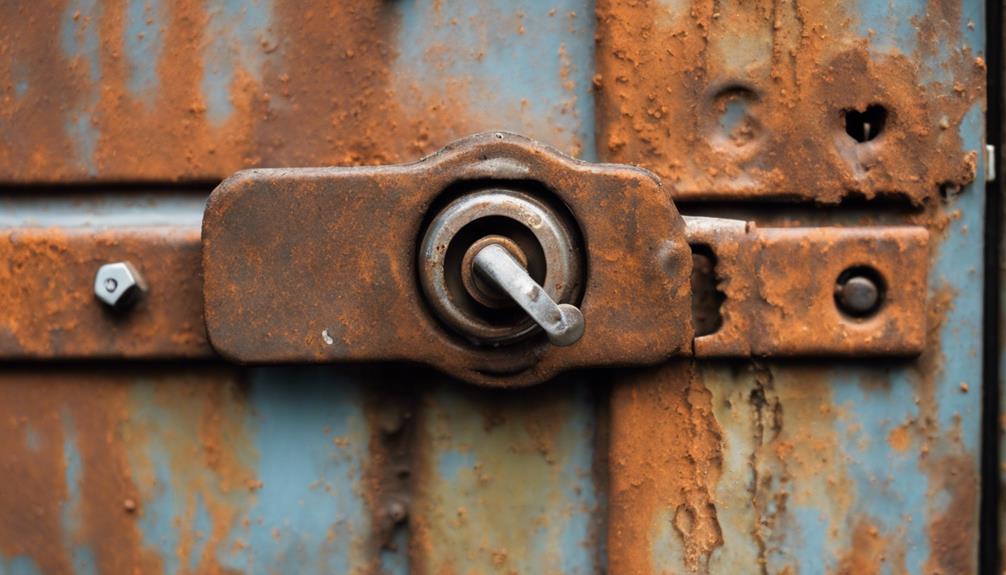
When it comes to garage door locks, one common issue that homeowners face is wear and tear on the lock mechanisms. Over time, the constant locking and releasing, exposure to the elements, and lack of maintenance can lead to these mechanisms not functioning at peak performance. To combat this, regular lock maintenance tips are essential. Make sure to lubricate the lock components periodically to keep them moving smoothly. Additionally, check for any loose screws or parts that may need tightening. Understanding the common lock types used in garage doors can also help in identifying the specific maintenance needs for each type. By staying on top of these maintenance tasks, you can guarantee that your garage door locks remain effective and reliable in protecting your home.
Essential Maintenance Tips for Garage Door Locks
Misalignment Issues on Garage Doors
If your garage door seems to be having trouble closing or opening smoothly, the culprit may be misalignment issues. Garage door misalignment can occur due to various reasons like loose tracks, worn-out rollers, or changes in weather affecting the door's balance. To address this, regular garage door maintenance is essential, including alignment adjustments to guarantee smooth operation and prevent further damage. Here is a table summarizing common signs of misalignment issues:
| Sign of Misalignment Issues | Description |
|---|---|
| Uneven gaps around the door | Gaps varying in width along the sides or bottom |
| Difficulty opening or closing | Door sticking or jamming during operation |
| Uneven movement of the door | Door tilting or jerking while opening or closing |
Vulnerability to Forced Entry Techniques
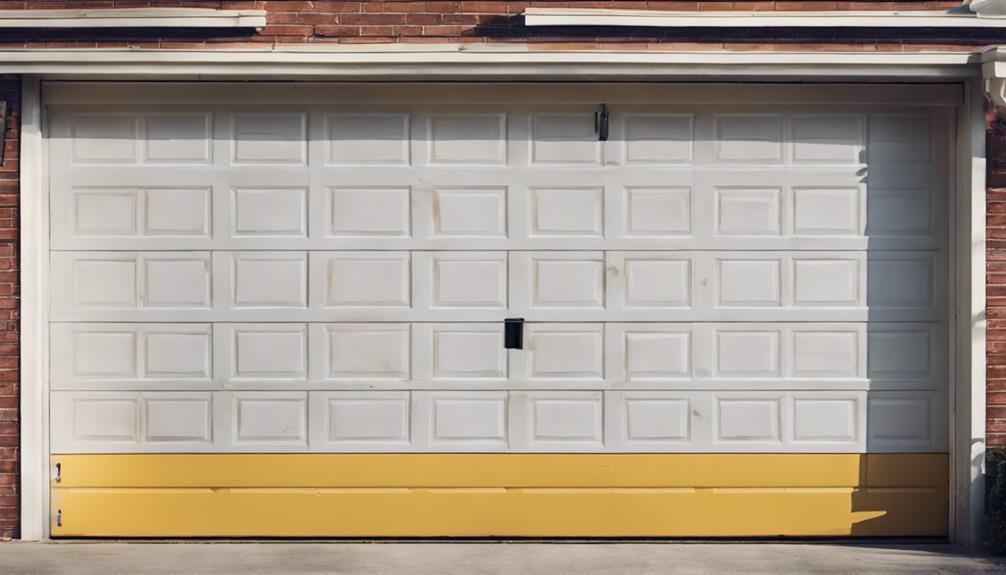
When it comes to garage door locks, it's vital to take into account the vulnerability to forced entry techniques. Lock picking vulnerabilities and easily bypassing mechanisms are common issues that can compromise the security of your garage. Understanding these weaknesses is essential in implementing effective security measures to protect your property.
Lock Picking Vulnerability
Lock picking vulnerability poses a significant threat to the security of your garage door. Lock picking techniques have evolved over the years, making traditional locks more susceptible to skilled intruders. Maintaining security awareness is essential to combatting this issue. Here is a humorous yet informative look at how lock picking can jeopardize your garage door's security:
| Common Lock Picking Methods | Description | How to Protect Against It |
|---|---|---|
| Bump Keys | Utilize a bumping motion | Install bump-resistant locks |
| Lock Picking Tools | Various specialized tools | Opt for high-security locks |
| Raking Techniques | Quick, simple method | Use locks with anti-raking pins |
Bypassing Mechanisms Easily
Easily bypassing the mechanisms of a garage door presents a significant vulnerability to forced entry techniques. When it comes to lock vulnerabilities, garage doors can sometimes be the Achilles' heel of home security. Intruders armed with basic tools can exploit weak points in garage door mechanisms, making entry a breeze. Bypass techniques like coat hanger tricks or even just a well-placed kick can render traditional garage door locks useless in seconds. It's like trying to keep a determined squirrel out of a bird feeder—it's going to find a way in. To combat this, consider upgrading to more secure locking mechanisms or reinforcing existing ones to deter unwanted guests from waltzing into your garage uninvited.
Ineffective Traditional Locking Systems
Amidst the evolving landscape of security technology, the reliance on traditional garage door locking systems has proven to be increasingly ineffective in safeguarding homes against forced entry attempts. These outdated methods lack the sophistication needed to deter modern intruders. Here are some reasons why traditional garage door locks fall short:
- Easy to Pick: Traditional locks are often basic and can be picked by those with minimal lock-picking skills.
- Prone to Tampering: They can be easily tampered with using common tools, rendering them useless.
- Susceptible to Bypassing: Intruders can bypass these locks through various simple methods.
- Limited Security Features: Traditional locks lack advanced security features found in modern systems, making them vulnerable to attacks. Consider upgrading your garage door security to enhance protection against potential intruders!
Lack of Security Features in Standard Locks
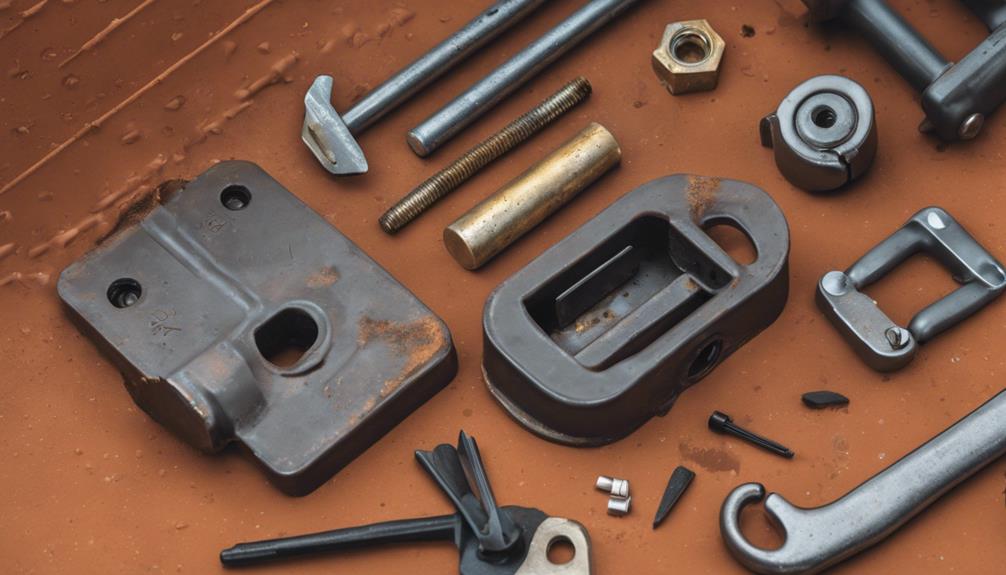
Standard garage door locks often lack the necessary security features to deter intruders effectively. The mechanisms in these locks are often insufficient in providing robust protection against forced entry attempts. Additionally, the vulnerabilities to manipulation in standard locks make them easy targets for unauthorized access. To enhance the security of your garage, consider upgrading to a more advanced lock system such as an electronic or smart garage door lock that offers additional layers of protection against break-ins.
Insufficient Lock Mechanisms
One of the most essential aspects of garage door security is the effectiveness of the lock mechanisms in place. When it comes to insufficient lock mechanisms, you might encounter the following issues:
- Lack of Deadbolt: Without a deadbolt feature, your garage door is more vulnerable to forced entry.
- Weak Cylinder Locks: Easily pickable cylinder locks provide little resistance to intruders.
- No Smart Lock Integration: Smart locks offer added security features that standard locks lack.
- Limited Locking Points: Insufficient locking points make it easier for burglars to manipulate the lock.
Ensuring your garage door lock mechanisms are robust through regular maintenance and security assessments is vital to safeguarding your property. Additionally, investing in quality locks, as discussed in Investing in Quality Locks: Is It Worth the Cost, can provide enhanced security and peace of mind.
Vulnerabilities to Manipulation
Within the domain of garage door security, vulnerabilities to manipulation arise due to the lack of advanced security features in standard locks. When it comes to lock durability, many standard garage door locks fall short, making them susceptible to picking or bumping techniques. These techniques are well-known among burglars and can compromise the security of your garage. To enhance your security awareness, consider upgrading to high-security locks that offer better resistance to manipulation attempts. These locks often come with additional features such as anti-pick pins and reinforced construction, providing a stronger defense against forced entry. By investing in more robust locks, you can greatly reduce the risk of unauthorized access to your garage and protect your valuable belongings.
Importance of Upgrading to High-Security Locks
Enhancing the security of your garage door by upgrading to high-security locks is an essential step in safeguarding your home and belongings. High-security locks offer superior protection against forced entry attempts, giving you peace of mind and deterring potential intruders. Here are four reasons why upgrading to high-security locks is a smart move:
- Advanced Technology: High-security locks often utilize cutting-edge technology, making them more resistant to picking and manipulation.
- Durability: These locks are typically constructed with robust materials, increasing their longevity and effectiveness.
- Key Control: High-security locks usually come with restricted keyways, reducing the chances of unauthorized key duplication.
- Enhanced Security Features: Many high-security locks incorporate additional security features such as drill resistance and bump resistance, further fortifying your garage door against break-ins.
Enhancing Security With Low Rate Locksmith
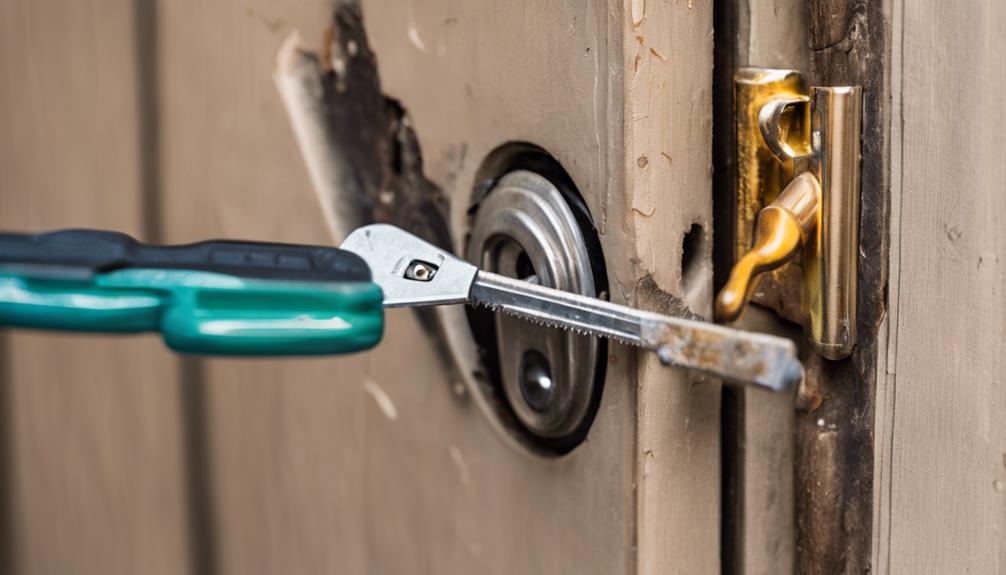
To boost the security of your garage door effectively, consider enlisting the services of Low Rate Locksmith. Low Rate Locksmith offers exceptional smart lock solutions that can considerably enhance the security of your garage. Their team of experts can conduct thorough security audits to identify any vulnerabilities in your current setup and recommend the best course of action to fortify your garage door against potential forced entry attempts. By utilizing their services, you can have peace of mind knowing that your garage is equipped with the latest in security technology and expert craftsmanship. Don't leave the safety of your belongings to chance – let Low Rate Locksmith take your garage security to the next level with their advanced solutions and expertise. Choosing the Best Secure Garage Door Locks for Your Home
Conclusion
Now that you are aware of the common problems with garage door locks and their vulnerabilities to forced entry, it's time to take action. Upgrade to high-security locks to protect your home from potential intruders. Remember, a chain is only as strong as its weakest link. Don't let your garage door lock be the weak link in your home's security chain. Stay one step ahead and fortify your property with the right security measures to keep your loved ones safe.

